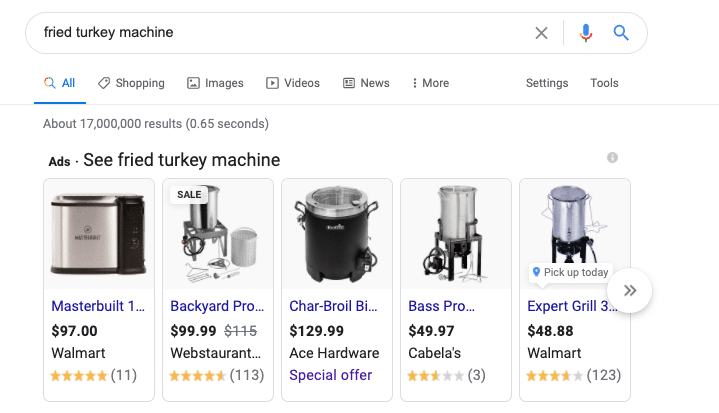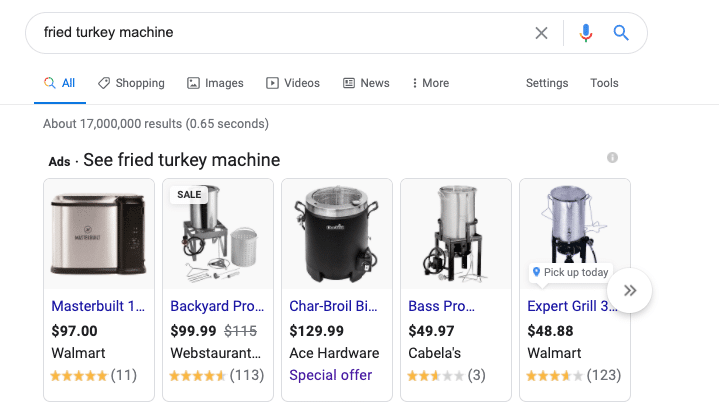
As a small business owner, it’s vital to get your website in front of as many eyes as you can. A big part of that is climbing the ranks of the search engine results page (SERP) so you’re one of the first businesses a potential client sees.
Both search engine marketing (aka SEM, Google Advertising) and search engine optimization (SEO) can help you achieve your desired goals.
So which should you focus your time and budget on? That depends on your situation, industry, location, and goals. Frankly, both serve an important purpose. But they offer different results and work on completely separate timelines.
Continue on to see what online advertising and SEO can do for your business and which strategy (if not both) is right for you.
Search Engine Marketing
When you think of online advertising, SEM might not be the first term that comes to mind. Or perhaps you may lump it in with SEO. Although they work in the same sphere, they’re two separate approaches to online marketing.
SEM is the process of increasing visibility through paid advertising.
Pay-per-click advertising is a specific wing of SEM that you can see in action on the SERP. You’re probably a bit more familiar with the term PPC being passed around in your networking and online research.
What are Pay-Per-Click Ads?
Pay-per-click ads on Google appear at the very top of the SERP. They sit directly above the “organic” search results, which are those web pages that are ranking via SEO strategies. Ads are a great way to get your web content above the fold.
When you type in a relevant search, the first 1 – 4 results on desktop and the first 1 – 3 results on mobile will typically be ads. You’ll see “Ads” typed out in bold before the URL of the website, indicating that what you are seeing as a user has been paid for to push in front of other results.
Typically, search ads have a similar look to an organic search result. But they can include more targeted information as well. Businesses can take advantage of this additional space to share their location, hours of operation, pricing, and more. Mostly, this is a good way to include a CTA (call-to-action) that hooks customers into clicking on your ad.
e-Commerce shops might benefit from visual product search ads. You’ll also see this type of ad referred to as a shopping ad. This variation of the ad is situated right under the search bar. It is a carousel of products relevant to a given search. Similar to a regular search ad, it gives businesses a chance to get their product in front of the consumer before their competitors can.

However, this wouldn’t be the type of ad you’d run for services whereas the search ad would be the best choice.
Another great perk of search ads is the ability to hyper-target them toward your ideal audience. Each dollar you spend is aimed at reaching only those you think could be potential customers or clients. You can set up parameters such as time of day, geographic location, previous site visitors, or even what device they’re searching on.
If you’re still determining who your ideal audience is, you can conduct an A/B split test. This allows you to place two similar ads with different parameters at the same time. You can then track them to see which variation performs best. Choose the percentage of potential customers that will see ad variation A over B or split them down the middle 50/50.
How Does Pricing on SEM Ads Work?
This entirely depends on the online advertising strategy you choose. Search ads – also known as PPC ads – are priced per click. That means you only pay when someone clicks on your ad. But that price point isn’t set in stone.
Cost-per-click (CPC) is varied across the board. When you set up an ad, you’ll place a bid at the highest CPC you’re willing to spend. Your industry and location will determine what price you should place your bid at. It all depends on what the competition for a given keyword is. Pricing will vary on how many businesses are willing to pay for the same keyword. Generally, the more competitive the business, the higher the costs grow.
The cost of an SEM ad campaign can vary drastically by industry, a customer’s search query, target location, and most importantly, target keyword. We recommend small businesses allocate a minimum of $1000 per month on search ads alone to see any kind of return. Keep in mind that you’ll pay for each visitor so it’s important to be profitable in order to meet business goals.
What is SEO?
SEO is the practice of optimizing a website so it will appear higher in organic SERPs. The top organic results of almost any inquiry you search on Google likely gained their ranking through tireless SEO work.

Where search ads give a business immediate results, SEO is all about patience, watching, and making continuous adjustments over time. If you’re just starting out, you’ll have to be resolute. Don’t expect your content to end up on the first page after one week of work. This is especially true if you’re competing with established, well-known businesses.
This is why many business owners look to ads and push SEO to the side. Businesses don’t think that the time spent on SEO is necessary or that the budget is worth it. However, this is where many business owners get their information mixed up.
Where it could cost you $90 for an ad click for one particular keyword search, if you can rank on page one of Google’s SERPs organically, it would basically be considered FREE. That’s right, free.
This is because you spent time developing your digital marketing plan with SEO principles, which put you ahead of the competition. Therefore, not only are you ranking for a keyword in a top position, but you also have gained a higher trust value from your potential customer because they found you via their own research, not an advertisement.
There is a lot of strategizing and patience involved in building up credibility with search engine algorithms. But despite the slow build-up, SEO can be worth your while in the long run. Unlike ads, the traffic you garner doesn’t slow down after the end of a campaign. Once you gain a steady stream of traffic, it can remain steady and continue to grow; you just need to continue with your SEO efforts before your competitors get wise.
How to Successfully Implement SEO
At the core of any SEO campaign is high-quality content – for search engines and humans. Crawlers - the tiny robots scouring the internet to categorize everything they encounter - reward authoritative voices that hold strong value for a visitor. A good SEO campaign walks the line between being a good source of information for a user as well as being search engine-friendly.
There are many ways to create a search engine-friendly and user-friendly website. One important factor is intent optimization. Be sure you’re using keywords and phrases relevant to your industry in your written content and web page copy. Understand what it is that your ideal customer is looking for when they enter the page so that you don’t confuse them or make them “bounce” (leave) your website.
Another huge part of SEO is answering questions. Remember, you’re the expert in your field. Be sure to share that knowledge with visitors to build up your authority online.
There are plenty of other methods to build SEO credibility such as working on local SEO efforts and optimizing multimedia content. The key is to keep up with changing search engine algorithm trends and adjust accordingly.
Which is More Cost-Efficient?
In general terms, SEO is free whereas ads require a budget. But when done efficiently, ads can be very profitable, and a lot faster. Of course, this isn’t a guarantee for every ad campaign you run. The word of SEM advertising can be difficult if you’re in a competitive industry. When a keyword is highly sought after, CPC can range from $20 – $100 per click.
If you’re in a highly competitive field and don’t want to pay loads of money into your online marketing efforts at the moment, strategic SEO might be where to focus.
Anyone can technically perform SEO best practices, but if you don’t have the time to allocate to this digital marketing strategy, it’s best to pay for an SEO agency to handle the workload. SEO specialists have spent years of research developing their skills since SEO changes every single day.
But do keep in mind that a lot of traffic garnered from SEO is informational. Visitors solely looking for an answer to their search query might take more effort to turn into paying customers. If you can rank for the same keywords that your customers are using to find advertisements from your competitors, then you’re as good as gold.
Each Strategy Exists on a Different Timeline
SEO is a long-term goal. Your efforts and any funds spent towards seeking professional assistance won’t be fruitful overnight. SEO is all about continued maintenance and patience. If you do your own SEO work, this may be relatively cheap. But if you hire help, it will be an ongoing investment that you won’t see results for right away. However, a good SEO specialist will do things the right way so you can see results faster.
Online advertising is a short-term strategy. When executed correctly, ads can give you immediate results. Moreover, a successful campaign will provide a worthwhile ROI in real time. Again, if you tackle ads yourself you can save money but you might not see the best results if you’re not familiar with SEM. Hiring a professional ads manager could be another significant investment to consider.
Which is More Effective?
Now here’s the real question: should you focus on ads or SEO? Let’s explore the benefits of both and determine which best fits your present marketing goals.
Benefits of Ads
- You can track your ROI better with ads. Analytics will clearly display how your ad performed and if you were profitable as a result.
- Ads are faster and more immediate where SEO is more of a long-term investment. It can be wise for a new company to go with ads to gain quick exposure.
- You can get hyper-granular with who sees your ad. This kind of targeted traffic means you can reach your ideal audience.
Drawbacks of Ads
- SEM is complicated. Running a successful ad can be tricky if you’re not familiar with the world of online advertising.
- If you don’t run a successful ad you can lose a significant amount of money.
- Since SEM is a popular method to gain immediate results, there’s a lot of competition to appear under the same keywords. This can drive up the CPC and, ultimately, your out-of-pocket expenses.
- The traffic generated by ads will end the moment your campaign stops.
Benefits of SEO
- SEO results stick. Once you earn traffic, it will likely remain fairly consistent.
- Many users trust organic results over search ads that appear on the SERP. According to Search Engine Watch, 94% of users turn to organic results.
- SEO is cheaper in the long run, but sometimes more expensive in the short run. You don’t have to constantly feed into it to maintain traffic. Where ads are a tap turned on and off with ad spend, SEO is a river tributary slowly eroding the land around it to grow larger and run faster as time goes on.
Drawbacks of SEO
- It can take a significant amount of time and effort to see results – especially as a small business competing with big-name competitors.
- You have no control over the audience seeing your content. SEO draws in a mixed bag of users and it can be harder to reach your ideal target audience.
- There are many businesses and agencies that participate in “black hat” SEO tactics. That means they play outside of the rules to get a leg up on their competition. These types of bad actors make it harder for “white hat” players to rank.
- There are a lot more factors at play when it comes to SEO so it can be difficult to pin down a definitive ROI.
Can They Work in Tandem?
Yes. In fact, ads and SEO complement each other extremely well. Both channels can be beneficial to maintain so you can take advantage of what each has to offer. They can even work together to help you build brand awareness. For instance, you can gain a visitor organically and then target them with an ad later on by using data acquired on your website from their previous visit(s).
If you have the time and funds to keep up with both ads and SEO, it’s always a good idea to do both.
Reach New Heights With Beyond Blue Media
Still unsure where to start? Or perhaps you simply don’t have the time to invest in executing search ads and SEO for your small to medium-sized business? Hand the reins over to the pros! We’ll move the needle for you.
Beyond Blue Media is poised to take your online presence to the next level. We know that successful marketing requires thorough planning, execution, and monitoring to achieve optimal results. With our team of experts in your corner, you can rest easy knowing that we’re putting in the work to implement a system that works for your business’s unique needs!


